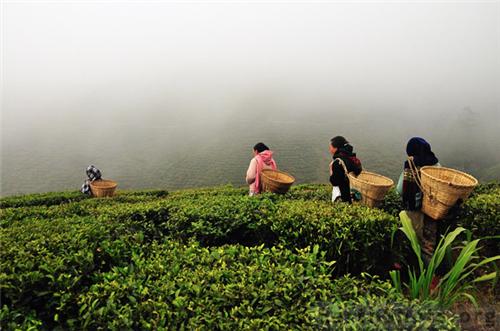Concerns Mount Over Darjeeling Tea Production: A Detailed Look

Table of Contents
Climate Change and its Impact on Darjeeling Tea Gardens
The delicate Darjeeling tea plant is highly susceptible to climate change's erratic patterns. Fluctuations in temperature and rainfall directly affect the yield, quality, and overall health of the tea bushes, jeopardizing Darjeeling tea production.
Shifting Rainfall Patterns
Unpredictable monsoons pose a significant threat to Darjeeling tea cultivation.
- Reduced rainfall: Leads to drought conditions, stressing the tea plants and impacting leaf quality. This can result in lower yields and a compromised flavor profile.
- Increased rainfall: Causes waterlogging, creating ideal conditions for fungal diseases and hindering the growth of tea bushes. This can lead to significant crop loss.
These extreme weather events severely impact the delicate ecosystem of the Darjeeling tea gardens, demanding robust adaptation strategies for Darjeeling tea production.
Rising Temperatures
Higher temperatures accelerate the oxidation process in tea leaves, altering their chemical composition and affecting the characteristic aroma and taste of Darjeeling tea.
- Faster oxidation: Leads to a loss of subtle nuances and a more astringent taste.
- Altered chemical composition: Impacts the overall flavor profile, potentially diminishing the prized muscatel flavor.
- Reduced aroma: The delicate floral and fruity notes, crucial to Darjeeling's identity, may be significantly reduced.
Scientific studies have correlated rising temperatures with a decline in the quality and quantity of Darjeeling tea harvests, highlighting the urgent need for climate-resilient cultivation practices for Darjeeling tea production.
Pest and Disease Infestations
Climate change creates a more favorable environment for pests and diseases, threatening Darjeeling tea plants.
- Increased incidence of blight: This fungal disease can devastate entire plantations.
- Aphids and other pests: These insects damage tea leaves, reducing yield and quality.
The increased use of pesticides to combat these infestations raises environmental concerns, further complicating the challenges faced by Darjeeling tea production.
Socio-Economic Challenges Facing Darjeeling Tea Farmers
Beyond environmental factors, socio-economic pressures significantly impact Darjeeling tea production. The industry faces a complex web of issues that threaten its long-term viability.
Labor Shortages
A dwindling workforce poses a considerable threat to the sustainability of Darjeeling tea plantations.
- Migration of workers to urban areas: Younger generations seek better opportunities outside the tea industry.
- Lack of attractive wages and working conditions: Makes tea farming an unattractive career choice for many.
This labor shortage directly translates into reduced productivity and increased production costs, further impacting Darjeeling tea production.
Low and Fluctuating Prices
Darjeeling tea farmers are highly vulnerable to volatile global tea prices.
- Competition from other tea-producing regions: Increased competition drives down prices, impacting farmers' incomes.
- Dependence on international markets: Makes them susceptible to global market fluctuations.
Low and unpredictable prices discourage investment in the upkeep and improvement of tea gardens, jeopardizing the long-term sustainability of Darjeeling tea production.
Land Ownership Issues
Land-related disputes and complexities further hinder the progress of the Darjeeling tea industry.
- Legal battles: Protracted legal disputes can tie up land and prevent investment.
- Land fragmentation: Makes it difficult to implement efficient farming practices.
- Difficulties in securing land rights: Creates uncertainty and discourages long-term investment.
These land ownership issues directly affect the expansion and modernization of Darjeeling tea cultivation.
Sustainable Practices and Potential Solutions
Addressing the challenges facing Darjeeling tea production requires a multifaceted approach focusing on sustainable practices and collaborative efforts.
Implementing Sustainable Agricultural Practices
Eco-friendly farming methods are crucial for mitigating the effects of climate change and improving yields.
- Organic farming: Reduces reliance on harmful pesticides and promotes biodiversity.
- Water conservation techniques: Improves water use efficiency and reduces the impact of droughts.
- Integrated pest management: Minimizes pesticide use while effectively controlling pests and diseases.
These sustainable practices are essential for ensuring the long-term health of Darjeeling tea gardens and enhancing the quality of Darjeeling tea production.
Government Support and Policies
Government intervention is crucial in supporting Darjeeling tea farmers and the industry.
- Subsidies: Providing financial assistance to farmers for adopting sustainable practices.
- Financial aid: Supporting research and development initiatives to improve cultivation techniques.
- Research and development initiatives: Investing in climate-resilient tea varieties and disease-resistant plants.
Effective government policies are vital for the survival and prosperity of the Darjeeling tea industry.
Promoting Fair Trade and Ethical Sourcing
Fair trade practices are essential to ensure better prices and working conditions for Darjeeling tea farmers.
- Consumer awareness campaigns: Educating consumers about the challenges facing Darjeeling tea production.
- Certification programs: Providing assurance of ethical sourcing and sustainable practices.
- Direct trade initiatives: Creating closer relationships between farmers and consumers.
Supporting fair trade initiatives ensures a more equitable distribution of profits and incentivizes sustainable Darjeeling tea cultivation.
Conclusion
The future of Darjeeling tea production hinges on addressing the interconnected challenges of climate change, socio-economic pressures, and the adoption of sustainable practices. The decline in production, coupled with the threats to the unique quality of Darjeeling tea, necessitates immediate and concerted action. By implementing sustainable agricultural techniques, securing adequate government support, and promoting fair trade, we can safeguard this iconic beverage for generations to come. Let's work together to protect the future of Darjeeling tea production, ensuring the continued cultivation and enjoyment of this treasured brew. Supporting the Darjeeling tea industry, promoting ethical Darjeeling tea cultivation, and making conscious choices when purchasing Darjeeling tea are all crucial steps in preserving this precious heritage.

Featured Posts
-
 Cormier Vs Johnson 2 Ufc 210 Predictions And Analysis
May 05, 2025
Cormier Vs Johnson 2 Ufc 210 Predictions And Analysis
May 05, 2025 -
 The Evolution Of The Mcu Learning From Past Mistakes To Create Better Stories
May 05, 2025
The Evolution Of The Mcu Learning From Past Mistakes To Create Better Stories
May 05, 2025 -
 Tioga Downs 2025 A Look Ahead At The Upcoming Racing Season
May 05, 2025
Tioga Downs 2025 A Look Ahead At The Upcoming Racing Season
May 05, 2025 -
 Georgetowns Newest Kentucky Derby Festival Queen
May 05, 2025
Georgetowns Newest Kentucky Derby Festival Queen
May 05, 2025 -
 Mexico La Batalla Por La Noche Entre Ufc Y Canelo Alvarez
May 05, 2025
Mexico La Batalla Por La Noche Entre Ufc Y Canelo Alvarez
May 05, 2025
